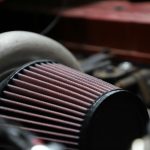DIY Guide to Replacing Your Car’s Air Filter: Easy Steps for Better Performance
Potential Issues After Replacement
After replacing your car’s air filter, there may be a few potential issues to watch for. These include unusual noises and the possibility of needing to consult a professional mechanic for more serious concerns.
Unusual Noises or Signs
If you notice unusual noises coming from your engine after replacing the air filter, it might be due to improper installation. Sounds like whining or hissing can indicate that the filter isn’t seated correctly. Additionally, be alert for signs such as poor acceleration, rough idling, or an illuminated check engine light.
Incorrectly fitted filters can allow debris into the engine, potentially causing damage over time. Always double-check that the filter fits snugly and seals properly to avoid these issues. If the noises persist, it’s essential to examine the air filter housing for any cracks or damage that might have occurred during the replacement process.
When to Consult a Professional Mechanic
Sometimes, despite best efforts, issues can arise that require professional attention. If your car continues to exhibit problems like a rough idle, decreased fuel efficiency, or reduced engine performance, a mechanic’s expertise may be necessary.
Professional mechanics have the tools and knowledge to diagnose and fix problems that might not be immediately visible. They can identify whether the air filter is the root cause or if there are other underlying issues. In rare cases, persistent issues after air filter replacement might indicate more severe problems within the engine, necessitating expert intervention to prevent further damage.
Driving conditions can also affect your car’s performance. If you drive in dusty or dirty environments, your air filter may need more frequent replacements. Consulting a mechanic can help determine the appropriate maintenance schedule based on your specific driving conditions.
Understanding the Benefits of Regular Replacement
Replacing your car’s air filter regularly can lead to tangible benefits such as improved fuel consumption and enhanced engine health and longevity.
Improved Fuel Consumption
A clean air filter plays a vital role in maintaining optimal fuel efficiency. When the air filter is dirty, it restricts airflow to the engine, forcing it to work harder and consume more gasoline. By ensuring the air filter is replaced regularly, the engine receives the proper amount of airflow, allowing it to operate more efficiently. This improved efficiency translates to better miles per gallon (MPG), reducing the frequency of trips to the gas station and saving money on fuel in the long run. Consistent air filter maintenance is a simple yet effective measure to enhance fuel consumption and overall vehicle performance.
Enhanced Engine Health and Longevity
Regular replacement of the air filter significantly contributes to the engine’s health and longevity. Clean air filters prevent harmful particles, such as dirt and debris, from entering the engine. Over time, these contaminants can cause wear and tear on engine components, leading to mechanical issues and costly repairs. By keeping the air filter clean, the engine remains well-protected, ensuring smoother operation and a longer lifespan. Additionally, a clean air filter promotes better engine performance by allowing the engine to breathe easier, which can result in more consistent power output. Preventive maintenance, including regular air filter replacement, is crucial in maximizing your car’s engine longevity and maintaining reliability.



